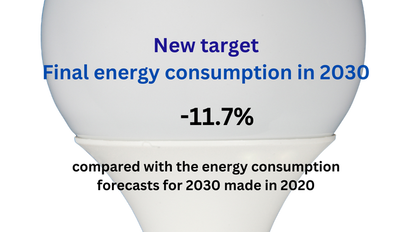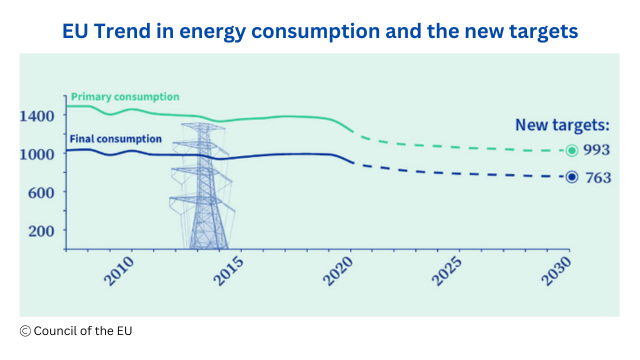|
Brussels, |
|
Energy Efficiency: EU Decides to Reduce Consumption by 11.7%
After 2 years of discussions with stakeholders and negotiations with European Parliament and between Member States, the Council of the EU confirmed by a vote the agreement reached.
On 25 July 2023, the Council of the EU adopted new rules to reduce final energy consumption at EU level by 42.5% in 2030 compared to the projections of the 2007 Reference Scenario, so that the Union’s final energy consumption amounts to no more than 740 Mtoe in 2030 and the Union’s primary energy consumption amounts to no more than 960 Mtoe in 2030.
By Federico Licandro Sirtori
Brussels, 2 August 2023 - 5 MINUTES READ
Brussels, 2 August 2023 - 5 MINUTES READ
After 2 year of negotiations, the Council of the EU, which is composed by the 27 ministers competent for energy, approved by majority the agreement reach with the European Parliament on a new Directive on Energy efficiency in Europe.
The EU decided to accelerate its energy transition to effectively reduce its greenhouse gas emissions and achieve climate neutrality. Saving energy and reducing its consumption are as crucial as shifting to cleaner forms of energy and to reach the Fit for 55 package objectives. By this decision, the emissions should be reduced by 55% compared to 1990 levels.
The Council agreed on a general approach on the revision of the directive in June 2022. A provisional agreement with the European Parliament was reached in March 2023. In July 2023, the Council adopted the new directive.
The EU decided to accelerate its energy transition to effectively reduce its greenhouse gas emissions and achieve climate neutrality. Saving energy and reducing its consumption are as crucial as shifting to cleaner forms of energy and to reach the Fit for 55 package objectives. By this decision, the emissions should be reduced by 55% compared to 1990 levels.
The Council agreed on a general approach on the revision of the directive in June 2022. A provisional agreement with the European Parliament was reached in March 2023. In July 2023, the Council adopted the new directive.
Each EU member state will play a role in achieving the overall EU target for climate neutrality. They will establish indicative national contributions and trajectories as part of their integrated national energy and climate plans (NECPs). The updated draft NECPs were scheduled for submission in June 2023, and the final plans are due in 2024.
The method for determining national contributions towards the target, as defined in Annex I of the proposal, will be indicative, allowing for a potential deviation of up to 2.5%.
To ensure that all contributions collectively meet the 11.7% target, the Commission will assess the cumulative effect. If any shortfalls are identified, the Commission will make adjustments to the national contributions that fall below what they would have been if the formula had been used (referred to as the gap-filling mechanism).
The formula used to calculate these contributions considers factors such as energy intensity, GDP per capita, the progress of renewable energy development, and the potential for energy savings, among other elements.
The method for determining national contributions towards the target, as defined in Annex I of the proposal, will be indicative, allowing for a potential deviation of up to 2.5%.
To ensure that all contributions collectively meet the 11.7% target, the Commission will assess the cumulative effect. If any shortfalls are identified, the Commission will make adjustments to the national contributions that fall below what they would have been if the formula had been used (referred to as the gap-filling mechanism).
The formula used to calculate these contributions considers factors such as energy intensity, GDP per capita, the progress of renewable energy development, and the potential for energy savings, among other elements.
What are the practical measures to reduce consumption?
Achieving such a reduction would likely involve a combination of policies, regulations, and initiatives to improve energy efficiency and promote sustainable practices across various sectors.
Some practical measures that EU member states and institutions might implement to reduce energy consumption include:
Some practical measures that EU member states and institutions might implement to reduce energy consumption include:
- Energy Efficiency Standards: Implementing and enforcing energy efficiency standards for buildings, appliances, and industrial processes to reduce energy wastage and promote the use of energy-efficient technologies.
- Renewable Energy Promotion: Encouraging the adoption of renewable energy sources, such as solar, wind, and hydroelectric power, to replace fossil fuels and reduce greenhouse gas emissions.
- Energy Audits and Management: Conducting energy audits to identify areas of inefficiency and developing energy management plans to optimize energy use.
- Incentives and Subsidies: Providing financial incentives, tax breaks, or subsidies to encourage individuals and businesses to invest in energy-saving technologies and renewable energy solutions.
- Transportation: Promoting sustainable transportation options, such as public transit, cycling, and electric vehicles, to reduce energy consumption in the transportation sector.
- Public Awareness and Education: Raising public awareness about energy conservation and providing education on energy-saving practices.
- Industry and Manufacturing: Implementing energy-efficient practices in industries and manufacturing processes to reduce energy consumption and emissions.
- Smart Grids and Demand Response: Utilizing smart grid technologies and demand-response programs to optimize electricity consumption and reduce energy waste.
- Building Renovations: Encouraging building renovations and retrofits to improve energy efficiency in existing structures.
- Research and Development: Investing in research and development of new technologies and innovations that can further improve energy efficiency and reduce consumption.
Some EU countries against or skepticals
"We are against the entire Fit for 55 package," said Polish Minister Robert Telus, "we have produced various statements on this and we ask that they be included in the meeting minutes." Warsaw voted against the new energy efficiency rules, along with Hungary and Finland (Belgium, Portugal, Slovenia, and Latvia abstained).
The Directive will be published in the EU Official Journal in August, and then the Member States will have to translate it into national legislative acts for implementation. It will be an enormous task, considering that the previous Directive of 2012 required more than 1000 national legislative acts, and 2030 is not so far away.
© Copyright eEuropa Belgium 2020-2023
Source: © European Union, 1995-2023
Source: © European Union, 1995-2023





